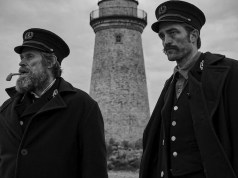“All boundaries are conventions waiting to be transcended,” says one of the characters in “Cloud Atlas,” an ambitious and frequently enthralling new epic directed by Andy and Lana Wachowski and Tom Tykwer. If that line and the others like it are in the David Mitchell novel it’s based on, you can see why the Wachowskis were attracted to it. Ever since “The Matrix” (when Lana was Larry), the siblings have been neo-spiritual gurus for a generation of movie fans, expanding minds in a way that straddles the line between genuine depth and “Whoa, dude, that’s trippy” pseudo-philosophy.
“Cloud Atlas” further explores humanity’s interconnectedness, and is mostly effective at it. It’s even more effective at being an audacious and risky piece of popular entertainment, unusual yet accessible. Set in six different time periods ranging from 1849 to a post-apocalyptic future, the film tells six stories that are separate but related, with themes and events that recur whether the characters realize it or not. That awareness, or lack of it, is part of the point: history repeats itself, and we make the same mistakes our forebears did unless we make a conscious effort not to.
Reinforcing this concept is the movie’s most noticeable stunt, whereby the major characters in each of the six stories are played by the same troupe of actors. Tom Hanks is an unscrupulous hotelier in one story, a thuggish author in another, a wise tribesman in another; Halle Berry is the Jewish wife of a composer in 1930s Europe, an investigative reporter in 1970s California; and so forth. For the sake of consistency, race and even gender are disregarded: Jim Sturgess is Asian in one segment; Doona Bae is Mexican in another; in one, Hugo Weaving is a woman. (Rest assured that Jim Broadbent is always a slightly dotty older fellow.)
By having the actors play multiple roles across timelines, the Wachowskis and Tykwer (“Run Lola Run”) don’t necessarily mean to suggest that the characters are reincarnations of specific souls. I don’t think it’s as literal as that. Rather, the suggestion is that as mankind gradually and painfully progresses, there will always be people, places, and things that are familiar, echoes of the past. In every era people are divided and restricted by race, class, sexuality — and, perhaps in the future, species. (Humans shall not fall in love with clones!) Love is a constant — romantic love, familial love, and a general love of one’s neighbor. Each story has moments in which a person must help someone else, without any benefit to himself, simply because failure to act would bring the other person harm. There are billions and billions of us, and everything we do affects the world as a whole.
The six stories aren’t equal in scope or in quality. The present-day segment, about an aging publisher (Broadbent) with money problems, is mostly comic relief, a light variation on the other stories’ weightier themes. It’s fun but has little resonance, and much of the humor is bumblingly flat. The story of a young gay man (Ben Whishaw) working as a composer’s assistant while pining for his lover (James D’Arcy) has a heartbreaking tenderness; the one set in a future Korea delivers sci-fi adventure and returns to the theme of forbidden love; the crusading reporter’s story, set in San Francisco in 1973, resembles the paranoid thrillers of that era.
All of these are interwoven by Alexander Berner’s fluid editing, which often uses the end of one scene as the jumping-off point for the next, holding our attention despite the potentially distracting leaps forward and backward in time. Society’s various methods of record-keeping help tie everything together as well: an 1849 character’s diary is read in 1936 by someone whose letters are found by someone in 1973, who becomes the subject of a book read in 2012 by someone whose own life is turned into a movie watched by someone in 2144, and so on. One generation’s records become the next generation’s scriptures.
Making a 172-minute film that spans multiple stories and time periods yet isn’t hard to follow is a feat in itself, and Tykwer and the Wachowskis deserve credit for pulling that off. How well it works for you on an emotional level may depend on how much you buy into the filmmakers’ earnest thematic declarations. The messages aren’t controversial — we should do what’s right; we should look out for one another; freedom is better than captivity — but the film states them with such heart-on-sleeve sincerity that it could be a turnoff if you’re not completely onboard already. Personally, I felt ennobled by the inspiring ideas, and captivated by the impressive performances both in front of and behind the camera. Whatever you make of “Cloud Atlas,” you can’t ignore it.
A- (2 hrs., 52 min.; )





